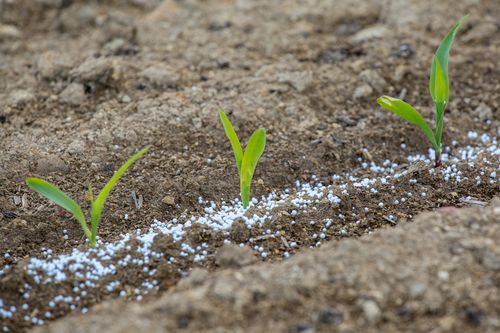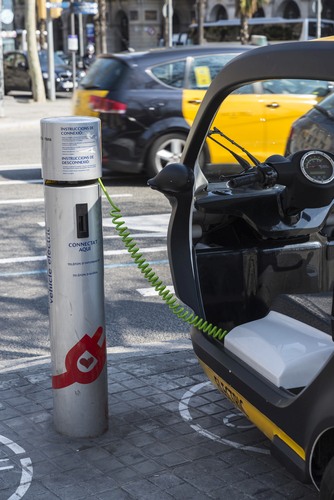Fertilizer sales up 12 percent year-on-year due to favorable weather
According to the ICRA rating agency, fertilizer sales in India increased by 12 percent year-on-year. Further growth in sales volume is expected as the area of winter-sown crops this season stands at about 67.5 million hectares. This increase in cultivated area is based on a high rainfall monsoon season, sufficient water in reservoirs, and subsidies from the government. Fiscal 2021 will be critical for the fertilizer industry, ICRA estimates. Manufacturers could sell record volumes, earn good profits and reduce debt.

Ravish Mehta, chief analyst at ICRA Ratings, said due to the extraordinary increased acreage in the winter season as well as a good summer harvest, fertilizer sales volumes have reached record levels in fiscal 2021. Sales volumes of individual fertilizer or fertilizer components increased in the range of 9 to 29 percent. The substances most in demand were urea, ammonium phosphate, compound fertilizer, potassium chloride and supersphospate. Fertilizer retailers also saw strong growth in fiscal 2021, as farmers mostly stockpiled small quantities to reduce their expenses.
The Indian government plans to provide further subsidies of between $12 billion and $13 billion to the fertilizer industry in the upcoming fiscal year 2022. With good crop forecasts for the current season, prices are expected to remain stable as well as government tax revenues to increase, ICRA analysts said. The winter season of Indian agriculture includes wheat, rapeseed, mustard and chickpeas. Wheat accounts for the majority at 33.7 million hectares, or 49 percent, followed by chickpeas at 10.9 million hectares and oilseeds such as rapeseed and mustard at 7.3 million hectares. For oilseeds, a record area was cultivated for this season, most of it in the state of Rajasthan, which accounts for 35 to 40 percent of the total cultivated area. Fertilizers and related chemicals require BIS-ISI certification before being imported into India or placed on the market. MPR International GmbH – India Certification will be pleased to assist you with BIS-ISI certification and is also available to answer any questions you may have.
Since 2012, the BIS has been gradually expanding the certification catalog and continuously adding additional goods. BIS certification mandatory for many electronic products for industrial and consumer uses. Factory inspections are also required for some products.
If you are interested in understanding what requirements are needed for your product to be imported into India, please do not hesitate to contact us by email or phone at +49-69-271 37 69 261. There is no cost or obligation for us to check for you. If a certification need is discovered we can provide a quotation to make sure that all your certification needs are covered.
If you have any questions you can also use our chat-window in the bottom right. (Please check your browser settings if you can’t see the window)
For more information about BIS certification, please refer to our free brochure “BIS Certification Made Easy“.
New requirements for BIS-certification chemicals in India starting in 2021
As of April 11 and November 11, 2021, Acrylonitrile and 29 other chemicals will fall under the mandatory BIS-CRS certification of India. These include, next to Acrylonitrile, Caustic soda, boric acid, acetic acid, aniline, methanol, toluene and acetone.
All affected substances and the relevant standards in each case are listed below:
| Product category | Indian Standard (IS) |
| Caustic Soda -Specification | IS 252:2013 |
| Boric Acid – Specification | IS 10116: 2015 |
| Poly Aluminium Chloride | IS 15573 |
| Acetic Acid | IS 695 |
| Aniline | IS 2833 |
| Methanol | IS 517 |
| Specification for Phthalic Anhydride, Technical | IS 5158: 1987 |
| Pyridine | IS 8058:2018 |
| Gamma Picoline | IS 16113:2013 |
| Beta Picoline | IS 16112:2013 |
| Morpholine | IS 12084: 2018 |
| Sodium Sulphide, Technical | IS 297:2001 |
| Potassium Carbonate, Anhydrous | IS 7129:1992 |
| Acetone | IS 170:2004 |
| Phosphorous Trichloride, pure and Analytical Reagent | IS 4581:1978 |
| Phosphorous Pentachloride, Technical | IS 11744:1986 |
| Phosphorous Oxychloride, Technical | IS 11657:1986 |
| Stabilized Hydrogen Peroxide | IS 2080:1980 |
| Precipitated Barium Carbonate, Technical | IS 3205:1984 |
| Precipitated Barium for Ceramic and Glass Industry | IS 12928:1990 |
| Sodium Formaldehyde Sulphoxylate | IS 4505:2015 |
| Sodium Tripolyphosphate, Anhydrous, Technical | IS 6100:1984 |
| n- Butyl Acrylate | IS 14709:1999 |
| Ether | IS 336:1973 |
| Ethylene Glycol | IS 5295:1985 |
| Toluene | IS 537:2011 |
| Terephthalic Acid | IS 15030:2001 |
| Methyl Acrylate | IS 14707: 1999 |
| Ethyl Acrylate | IS 14708:1999 |
| Vinyl Acetate Monomer | IS 12345:1988 |
| Styrene (Vinyl Benzene) | IS 4105:2020 |
| Maleic Anhydride, Technical | IS 5149:2020 |
| Acrylonitrile | IS 12540:1988 |
The extension of the scope of mandatory certification for chemicals is in line with the so-called “2023 Plan” of the Indian Prime Minister Modi. Based on this plan, the Indian government since 2019 has already been pursuing the goal of ensuring the quality, safety and reliability of the products available on the market through strong expansions of the certification regulations. Therefore, it is expected that more and more products will fall under a mandatory certification in the coming years.
BIS-ISI certification includes testing in India as well as inspections of manufacturing factories. Requirements for in-house testing capabilities are also typically high.
To find out if your products have now been added to the mandatory certification list, please contact us. Since the list is constantly changing and expanding, it is often not clear whether a product falls under the certification obligation or not.
We can assist you and provide reliable information about the regulations for your product.
We will be happy to assist you with the BIS certification and are available to answer any questions you may have. Please send us an e-mail or call us at +49-69-2713769261.
You can also take a look at our free India Certification brochure, which you can download here as a PDF file.
Certification requirement for Automotive Glass is moved from AIS to BIS
IS2553 used to be under the responsibility of the individual Automotive certification agencies such as ARAI or iCAT, but starting August 2021 BIS (Bureau of Indian Standards) will be responsible for the products applying to this standard. Therefore, certification from then on is no longer voluntary, but mandatory.
The certification process is now to be carried out by all importers with BIS. This process consists, among other steps, of product tests in India as well as a factory audit. In addition, some test requirements are changing such as abrasion tests or moisture tests.
The change applies to the following product types:
| SI. No. | Goods or Articles | Indian Standard | Title of Indian Standard |
| (1) | (2) | (3) | (4) |
| 1. | Safety Glass (Architectural, Building and General uses) | IS: 2553 (Part 1):2018 | Safety Glass – Specification Part 1 Architectural, Building and General uses |
| 2. | Safety Glass (For Road Transport) | IS: 2553 (Part 2): 2019 | Safety lass – Specification Part 2 For Road transport |
Since the list is constantly changing and expanding, it is often not clear whether a product is subject to certification or not.
We can help you here and provide reliable information about the regulations for your product.
We are happy to support you with BIS Certification and are available at any time to answer any questions you may have. Write us an email or call us at +49-69-2713769150.
You can also view our free India Certification Brochure, which you can download as a PDF file here.
Indian market for electric vehicles to become more attractive through new regulations
Ahead of upcoming deliberations on the Indian state government’s annual budget, the Society of Manufacturers of Electric Vehicles (SMEV) has urged Finance Minister Nirmala Sitharaman to revamp the FAME subsidy program. The association said to either revise the upcoming Phase 2 of FAME or reintroduce Phase 1 of FAME. The budget of the FAME 2 incentive program is the equivalent of about $1.37 billion, is for a three-year period and was introduced on April 1, 2019. Phase 2 is an extension of the FAME 1 India program, which came into effect on April 1, 2015 with a sum of $123 million. The acronym FAME stands for “Faster Adoption and Manufacturing of Hybrid and Electric Vehicles.”

In addition, it hopes to see a reduction in VAT for electric vehicles. SMEV Chairman Sohinder Gill also wrote, “For a young and fragile industry like electric vehicles, which is also heavily dependent on government subsidies, there is a need for an effective strategy to support the market. The electric vehicle industry is still behind its target figures.”
The plan was to support 1 million electric two-wheelers, 500,000 three-wheelers, 55,000 passenger cars and light commercial vehicles, and 7,000 buses. The SMEV argued that FAME 2 needs to be more attractive for customers because conditions, especially for two-wheelers, need to be made affordable for the mass of the population despite subsidies. To support the Indian automotive industry, the deadline for subsidy applications to manufacture components for electric vehicles has been extended for the second time to April 1, 2021.
The relevant technical automotive standards, called Automotive Industry Standards or AIS for short, apply to Indian manufacturing locations. The process of AIS certification according to the Indian AIS (Automotive Industry Standard) can be challenging and complex. We will be pleased to support you in the AIS certification process and are also available to answer any questions you may have.
AIS stands for Automotive Industry Standards, the technical automotive standards for India, while TAC stands for Type Approval Certificate. This kind of automotive product certifiation is conducted by authorities like the International Center for Automotive Technology (iCAT).
Depending on the product category, there are different certification steps. We will be happy to advise you on certification in India and are always available to answer your questions.
Please do not hesitate to contact us for further details and consultation. You can contact us via e-mail, or call us (UK: +44 2071931135, Rest of Europe: +49 69 2713769261, US: +1 773 654-2673).
If you have any questions you can also use our chat-window in the bottom right. (Please check your browser settings if you can’t see the window)
You can also check out our free AIS-Brochure, which can be downloaded right here as a PDF file.



